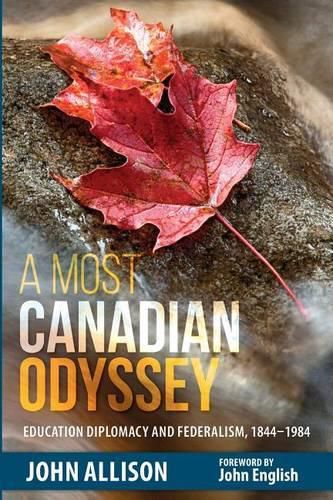Readings Newsletter
Become a Readings Member to make your shopping experience even easier.
Sign in or sign up for free!
You’re not far away from qualifying for FREE standard shipping within Australia
You’ve qualified for FREE standard shipping within Australia
The cart is loading…






This title is printed to order. This book may have been self-published. If so, we cannot guarantee the quality of the content. In the main most books will have gone through the editing process however some may not. We therefore suggest that you be aware of this before ordering this book. If in doubt check either the author or publisher’s details as we are unable to accept any returns unless they are faulty. Please contact us if you have any questions.
This book was first published as a peer-reviewed monograph by Althouse Press at Western University in London, Canada. Now, the original manuscript has been reprinted for worldwide distribution.
Drawing on historical research, John Allison documents the history and development of Educational Diplomacy in Canada. In setting the stage, he looks at its early development via the voyages of Egerton Ryerson, the importance of education at Confederation, and developments in the early twentieth century leading up to the 1960s. The principal focus of the book, however, takes the reader through the 1960s, the rise of the Council of Ministers of Education, Canada (CMEC), the activities of Paul Gerin-Lajoie to extend Quebec’s jurisdiction in this area, and the federal response. With the Organization for Economic Cooperation and Development (OECD) Country Education Review in 1975-1976, Canada faced new challenges in this field. In his examination of the latter part of the 1970s, Allison analyzes the ongoing debates and discussions concerning who oversaw education diplomacy: Ottawa and the Department of Foreign Affairs (now Global Affairs Canada) or the provinces and CMEC. In the early 1980s, a Memorandum of Understanding between the provinces (as represented by CMEC) and the federal government was signed. Rather than addressing it in a dynamic fashion, this had the effect of mummifying the question. Canadian education diplomacy is a field in which all governments could do far better. With the history of this question in hand, leaders, governments, and Canadian educators can more effectively look anew at this issue and search for innovative and better approaches to Canadian-style education diplomacy.
$9.00 standard shipping within Australia
FREE standard shipping within Australia for orders over $100.00
Express & International shipping calculated at checkout
This title is printed to order. This book may have been self-published. If so, we cannot guarantee the quality of the content. In the main most books will have gone through the editing process however some may not. We therefore suggest that you be aware of this before ordering this book. If in doubt check either the author or publisher’s details as we are unable to accept any returns unless they are faulty. Please contact us if you have any questions.
This book was first published as a peer-reviewed monograph by Althouse Press at Western University in London, Canada. Now, the original manuscript has been reprinted for worldwide distribution.
Drawing on historical research, John Allison documents the history and development of Educational Diplomacy in Canada. In setting the stage, he looks at its early development via the voyages of Egerton Ryerson, the importance of education at Confederation, and developments in the early twentieth century leading up to the 1960s. The principal focus of the book, however, takes the reader through the 1960s, the rise of the Council of Ministers of Education, Canada (CMEC), the activities of Paul Gerin-Lajoie to extend Quebec’s jurisdiction in this area, and the federal response. With the Organization for Economic Cooperation and Development (OECD) Country Education Review in 1975-1976, Canada faced new challenges in this field. In his examination of the latter part of the 1970s, Allison analyzes the ongoing debates and discussions concerning who oversaw education diplomacy: Ottawa and the Department of Foreign Affairs (now Global Affairs Canada) or the provinces and CMEC. In the early 1980s, a Memorandum of Understanding between the provinces (as represented by CMEC) and the federal government was signed. Rather than addressing it in a dynamic fashion, this had the effect of mummifying the question. Canadian education diplomacy is a field in which all governments could do far better. With the history of this question in hand, leaders, governments, and Canadian educators can more effectively look anew at this issue and search for innovative and better approaches to Canadian-style education diplomacy.